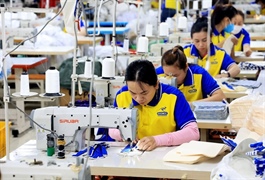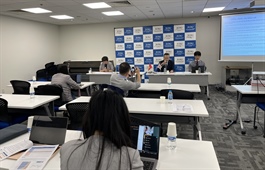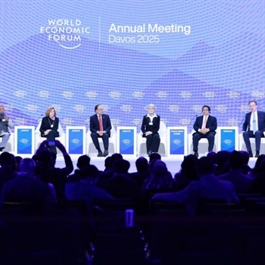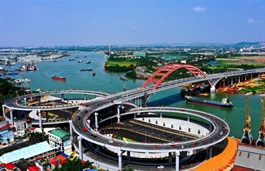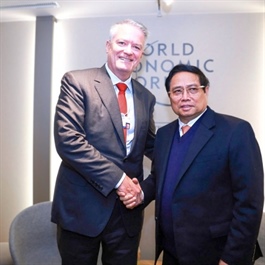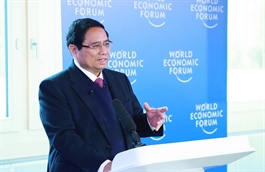Typhoon Yagi impacts FMCG purchasing power in northern Vietnam: Kantar
Typhoon Yagi impacts FMCG purchasing power in northern Vietnam: Kantar
Typhoon Yagi, which struck northern Vietnam in September 2024, has significantly affected consumer purchasing behavior in the region, with lasting implications expected for the upcoming Vietnamese New Year (Tet) and throughout 2025, according to Kantar, a global leader in marketing data and analytics.

Shoppers at a supermarket that features specific items for Tet (Lunar New Year) in Vietnam. Photo: Saigon Co.op |
One of the most powerful typhoons to hit Asia in recent years, Yagi made landfall in the northern region on September 7, 2024, causing widespread damage.
The disaster was expected to reduce Vietnam’s GDP growth for 2024 by 0.15 percentage points.
Beyond its economic toll, the typhoon disrupted the fast-moving consumer goods (FMCG) market and altered consumer priorities in northern Vietnam, according to a Kantar report released on Thursday.
The report highlights the uncertainty triggered by typhoon Yagi, which has resulted in both short-term shifts in FMCG spending and longer-term changes to consumer priorities for 2025.
The disaster heightened concerns about climate change and natural disasters, which emerged as one of the top two issues for Vietnamese consumers in Q3 2024.
In Hanoi, the proportion of the population worried about such events surged to 56 percent in Q3 2024 from nine percent in Q3 2023.
Coupled with rising food prices, this uncertainty has significantly influenced spending behavior.
“While the immediate impacts of the typhoon are temporary, the recovery process in northern Vietnam, which is less accustomed to such severe natural disasters, may take longer,” Kantar noted.
“This could result in budget constraints for certain product categories and a focus on recovery efforts in the coming year.”
Data from Worldpanel underscores the typhoon’s impact on consumer confidence in the economy.
In Q3 2024, only 69 percent of consumers felt optimistic about the economy, compared to 80 percent in Q2.
As seen during the pandemic, crises often prompt a surge in demand for essential FMCG items as consumers stock up.
However, post-typhoon purchasing behavior in northern Vietnam revealed nuanced patterns.
In Hanoi, the immediate aftermath saw a sharp rise in demand, likely driven by stockpiling and preparations for potential flooding.
In contrast, rural areas, which suffered more severe economic and agricultural damage, experienced reduced purchasing power and shifted consumer priorities.
This resulted in less significant growth in FMCG spending, with packaged foods and certain beverages prioritized over personal care and home care products in September last year.
Rural households also relied more heavily on donations from relief efforts, focusing on essentials like food, water, and medicine while cutting back on non-essential FMCG items.
Worldpanel reconnected with panelists living in the typhoon-affected areas. Urban residents in Hanoi reported minimal income disruptions and a slight increase in stockpiling.
However, rural households experienced significant losses to livelihoods and assets, sharply reducing their disposable income. Consequently, their FMCG spending either stagnated or declined.
Looking ahead, rural households are expected to prioritize rebuilding livelihoods and financial recovery in 2025, which will likely constrain their FMCG spending.
The typhoon’s medium- to long-term consequences on rural consumption could be profound, with extended impacts on livelihoods and infrastructure further exacerbating economic challenges.
According to Kantar, Tet 2025, which falls on January 29, will remain a crucial period for FMCG brands, as the holiday season often accounts for up to a quarter or even a third of annual sales.
Worldpanel’s festive studies show that the season is especially important in the north, where traditional celebrations hold deep cultural significance.
While Vietnamese consumers across the country will focus on essential spending, their rationalization strategies will differ.
In the north, the cultural importance of Tet ensures its continued relevance, even amid economic challenges. Shoppers are more likely to reduce spending during non-holiday months to preserve their budgets for Tet preparations.
However, the decline in disposable income for many households will limit their Tet-related spending.
Economic uncertainty following the typhoon may lead to cautious consumer behavior, resulting in moderate or subdued growth for Tet 2025 compared to the previous year.
Rural households, in particular, are expected to allocate more of their budgets to rebuilding homes and livelihoods, further shifting their spending priorities.
Ongoing concerns about food costs and natural disasters will continue to shape Vietnamese shoppers’ spending intentions, Kantar commented.
“Tet remains highly relevant in the north, which is why rationalized spending will not be as apparent there compared to the south, where consumers tend to have a more relaxed and simplified holiday,” the company said.
However, following Tet, northern consumers may adopt a more cautious approach to spending, potentially stalling FMCG growth in subsequent quarters, Kantar added.








